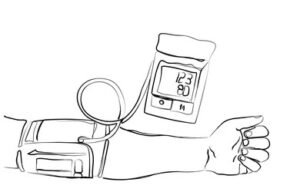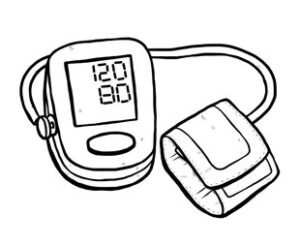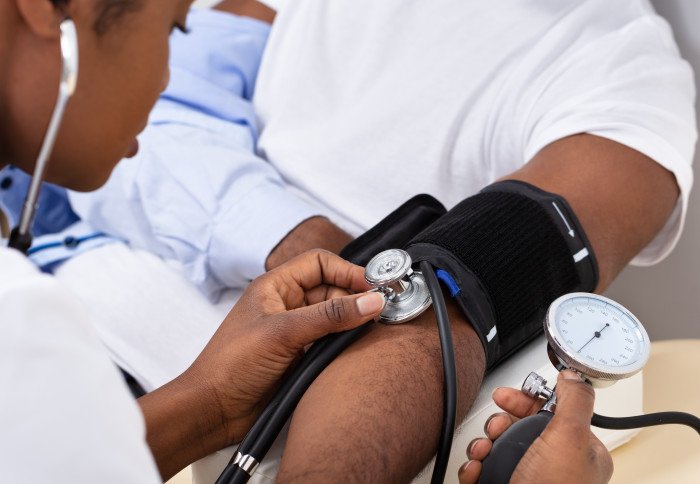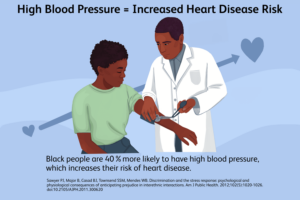Highlights of the Article
- How to Identify high and low blood pressure
- Signs of High and low blood pressure
- Symptoms of High and low blood pressure
- Practical tips on how to maintain a healthy blood pressure balance.
High or low blood pressure are serious health conditions often referred to as the “silent killer.” They are on the list of the common health issue that many men overlook.
Despite being a vital sign, blood pressure readings can often go unnoticed, especially when individuals feel fine. However, these seemingly silent numbers can have a significant impact on your overall health.
Most men may not realize that high blood pressure can lead to serious complications and low blood pressure can also pose unexpected challenges, like dizziness or fatigue.
Therefore, it is expedient to understand the implications of high or low blood pressure.
In this article, we’ll learn about the the causes, symptoms, and risks associated with these conditions, as well as practical tips to maintain healthy blood pressure levels.
What is blood pressure and why is it important for men?

Blood pressure is the force of blood that pushes against the walls of your arteries as your heart pumps it around your body.
It is expressed as two numbers; systolic (the pressure when your heart beats) and diastolic (the pressure when your heart rests between beats).
For men, maintaining healthy blood pressure levels is crucial because it influences everything from your energy levels to your heart health. Below is a clear difference between high or low blood pressure.
High blood pressure

Also called hypertension, high blood pressure can develop over time due to unhealthy eating, lack of exercise, and stress.
For example, a man who frequently eats salty foods and skips workouts may find himself facing high blood pressure, which can lead to heart disease or stroke.
Low blood pressure
On the other hand, low blood pressure also known as hypotension can cause symptoms like dizziness or fainting, especially if you stand up too quickly. Picture a man gets up from the couch too fast after a long day of work and suddenly feels lightheaded, this could be a sign of low blood pressure.
What Are the Risks of Ignoring Blood Pressure Health?
Ignoring your blood pressure health can lead to serious consequences. High blood pressure left untreated can strain your heart, leading to conditions like heart failure or kidney damage.
Meanwhile, low blood pressure can result in inadequate blood flow to vital organs, affecting mental clarity and physical performance. Imagine that you are trying to play a game of basketball or football but you’re so tired and confused that you can’t even keep up.
That is what ignoring your blood pressure can do to you. By recognizing and managing your blood pressure, you will be able to maintain both your physical and mental well-being.
What Causes High or Low Blood Pressure in Men?
Blood pressure levels in men can be influenced by either lifestyle, genetics, and age. High and low blood pressure have different causes, each impacting your overall health.
Causes of High Blood Pressure
1. Diet Choices
Poor diet is a primary factor in high blood pressure. Men who consume a lot of junk either through processed snacks or sugary drinks, are more prone to having hypertension.
A man who frequently eats outside due to a busy job can find his blood pressure levels increased over time.
2. Lack of Physical Activity
An inactive lifestyle can also contribute to high blood pressure. Men who don’t exercise regularly may experience elevated blood pressure, because a less active heart has to work harder to pump blood.
For example, as a man, if you spend most of your weekdays at a work desk and then relax on the couch as soon as you get home without any physical activity, this habit can put you at risk of high blood pressure.
3. Blood Pressure Spikes
Chronic stress can cause temporary spikes in your blood pressure that can turn permanent if unmanaged.
For instance, a man under constant work pressure is more prone to seeing his blood pressure consistently going high, which will impact his health long-term.
4. Genetics
Genetics play a big role in blood pressure levels. Men with a family history of high or low blood pressure are more likely to develop similar issues.
For instance, a man whose parents both had high blood pressure, as he grows older, he might also face the same risk even with a healthy lifestyle.
Causes of Low Blood Pressure
i. Dehydration
Dehydration is a frequent cause of low blood pressure. A man who doesn’t drink enough water, particularly during the hot weather and in busy cities that tend to get hot most of the time, may experience symptoms like dizziness due to reduced blood volume.
This automatically lowers blood pressure. Staying hydrated is essential for a balanced blood flow.
ii. Side effects of Drugs
Certain medications, especially those for heart conditions, can lower your blood pressure. For example, a man taking medication for a heart problem may later find out that his blood pressure starts to drop, causing light-headedness or fatigue as a side effect of that drug.
iii. Age
As men age, underlying heart conditions can also contribute to low blood pressure. Older men may experience this more because the efficiency of their heart starts to reduce, leading to symptoms like dizziness and fatigue, especially when trying to stand up.
How does Low Blood Pressure affect men’s health?

Low blood pressure, or hypotension, may seem harmless but can seriously impact men’s health and well-being. When blood pressure drops too low, it can prevent enough blood from reaching vital organs, leading to a variety of symptoms that disrupt daily life.
These are some of the signs low blood pressure in men can present with:
Warning Signs of Low Blood Pressure in Men
1. Dizziness and Light-headedness
One of the most common symptoms is dizziness which often strike when you are standing up too quickly or moving too fast. For example, a man may feel unsteady and wobbly after rising up from a chair, which can increase his risk of falling or feeling off balance during the day.
2. Fatigue and Low Energy
Men with low blood pressure may feel tired all the time, sometimes beyond normal fatigue. This kind of exhaustion can make everyday tasks feel challenging and can limit your productivity.
A man struggling experiencing this sign might find himself nodding off at work or lacking energy to engage in any physical activity.
3. Confusion and Difficulty Concentrating
When low blood pressure affects blood flow to the brain, it can cause confusion and reduced focus. For instance, a man might experience what is known as “brain fog” during meetings or forget important details more often, which can affect the way he performs.

Why Low Blood Pressure is often overlooked by men
Here are some of the beliefs surrounding low blood pressure in men:
1. Because it is “Low” it is Safer
Many men think that low blood pressure is inherently less dangerous than high blood pressure, so they may ignore any symptoms that present itself.
2. Thinking symptoms are because of Age or fatigue
Symptoms like fatigue or dizziness are often attributed to aging, stress, or lack of sleep rather than an underlying blood pressure issue.
3. Less Public Awareness
Many men are unaware that low blood pressure can also be dangerous because any public health messages or health talk primarily focuses on high blood pressure.
Practical ways to manage High or Low Blood Pressure in men

Managing blood pressure doesn’t have to be complicated. By making small adjustments in your daily routine, it can make a significant impact on your heart health, helping you to keep both high and low blood pressure in check. Some of the tips include:
i. Cut Back on Salt
Excess salt is a major cause of high blood pressure. Reducing salt by cooking with natural flavourful spices can add flavour without any risk.
Men who also love fast food or snacks can look for “low sugar” options to ease the transition.
ii. Eat foods rich in potassium
Potassium helps to balance sodium levels, thereby reducing your blood pressure naturally. Bananas, sweet potatoes, and spinach are easy potassium rich foods.
Also adding a banana to your breakfast or snacking on a few nuts can help men reach their daily potassium needs without effort.
iii. Drink enough water to stay hydrated
Dehydration can cause low blood pressure, so drinking enough water is essential. Keep a water bottle handy at work or in the car to make hydration a habit.
iv. Limit Alcohol and Caffeine
Alcohol and caffeine can cause blood pressure to spike, so men should always monitor their alcohol intake. Opting for herbal teas or water over another cup of coffee or glass of alcohol can help to manage blood pressure levels.
The role of exercise and stress management in Blood Pressure

-
Regular physical activity
Physical activity strengthens the heart and helps manage both high and low blood pressure. Even if its a 30-minute daily walk, it can boost your circulation and maintain blood pressure.
Men with busy schedules can incorporate movement into their day at work, such as taking the stairs instead of the elevator.
-
Engage in relaxation techniques
Managing stress is key to maintaining healthy blood pressure. Deep breathing exercises, meditation, or even a few minutes of stretching can help to relieve stress.
For example, you could try a short breathing exercise during work breaks to reduce any form of tension.
-
Stay consistent
Your small and consistent efforts will add up over time. If you commit to these changes, even if just a few days each week, it can effectively manage your blood pressure and make you feel healthier every day.
When should men see a doctor for HBP or LBP??

Knowing when to see a doctor about blood pressure can be a game-changer in preventing serious health issues. Recognizing red flags and keeping up with regular check-ups are essential.
They include;
1. When you feel exhausted or dizzy all the time
If a man often feels lightheaded or unusually tired, it may signal dangerously low blood pressure. For instance, if he feels dizzy after standing up or get tired quickly, it’s time to consult a doctor.
2. When you experience severe headaches or chest pain
For high blood pressure, symptoms like persistent headaches or a feeling of tightness in the chest shouldn’t be ignored. If you experience these symptoms, especially if they’re new or frequent, you should seek medical advice promptly.
3. If you experience blurry vision and shortness of breath
Blurred vision or difficulty breathing can indicate high blood pressure spikes. A man noticing these signs, especially during physical activity or stress, should consult a doctor.
4. Routine check-ups
Regular doctor visits can help to monitor your blood pressure, thereby catching potential issues early. Men are encouraged to have at least one check-up yearly.
5. Personalized advice and lifestyle adjustments
A doctor can provide lifestyle advice based on your medical history with blood pressure. For men with a family history of blood pressure issues, regular visits can ensure they stay on top of any early changes before they become serious concerns.

Conclusion
Making your blood pressure health a priority is one of the best investments a man can make in his long-term well-being.
Taking small and simple steps like staying active, eating balanced meals, and scheduling regular check-up can have a huge impact on your health.
Recognizing and managing blood pressure, whether high or low, can help you avoid future complications.
Don’t wait for warning signs before you make a change. Start with achievable actions that fit into your daily routine and see the positive effects it can bring.
At Enthusiast Express, we’re dedicated to empowering men to take control of their health, with blood pressure management as a key foundation.
Subscribe to Enthusiast Express for expert insights on men’s wellness, including practical tips for managing high and low blood pressure.
Also join our community of men committed to smart, lasting health choices.


